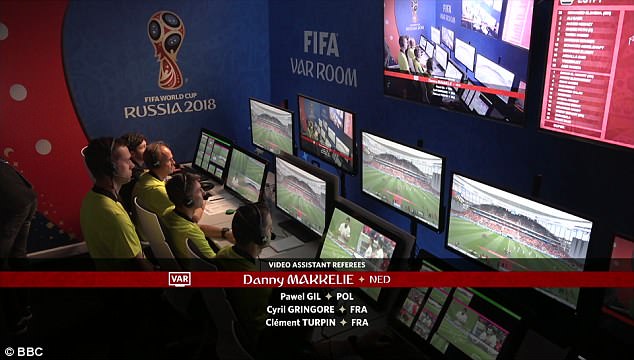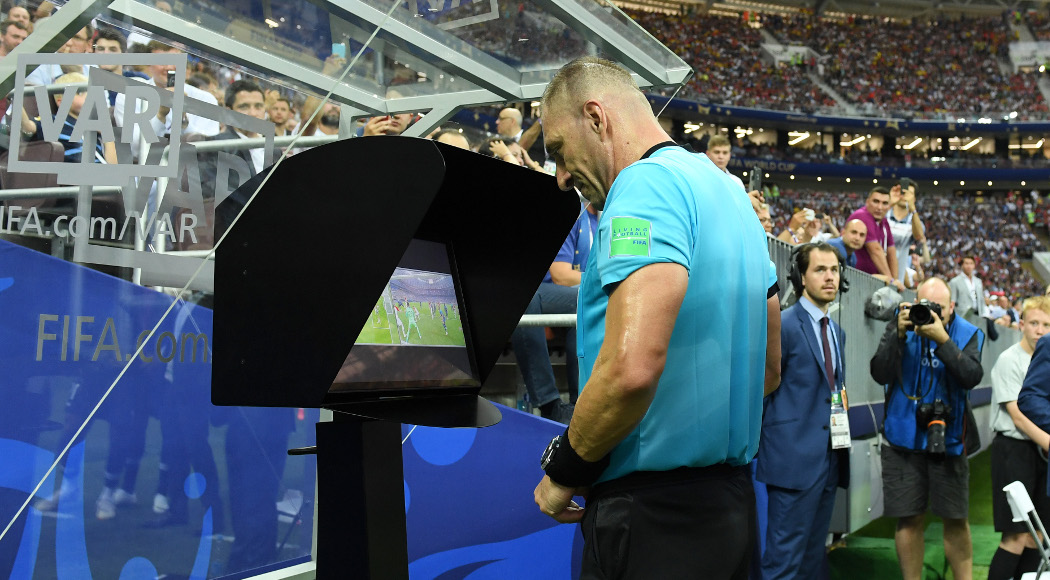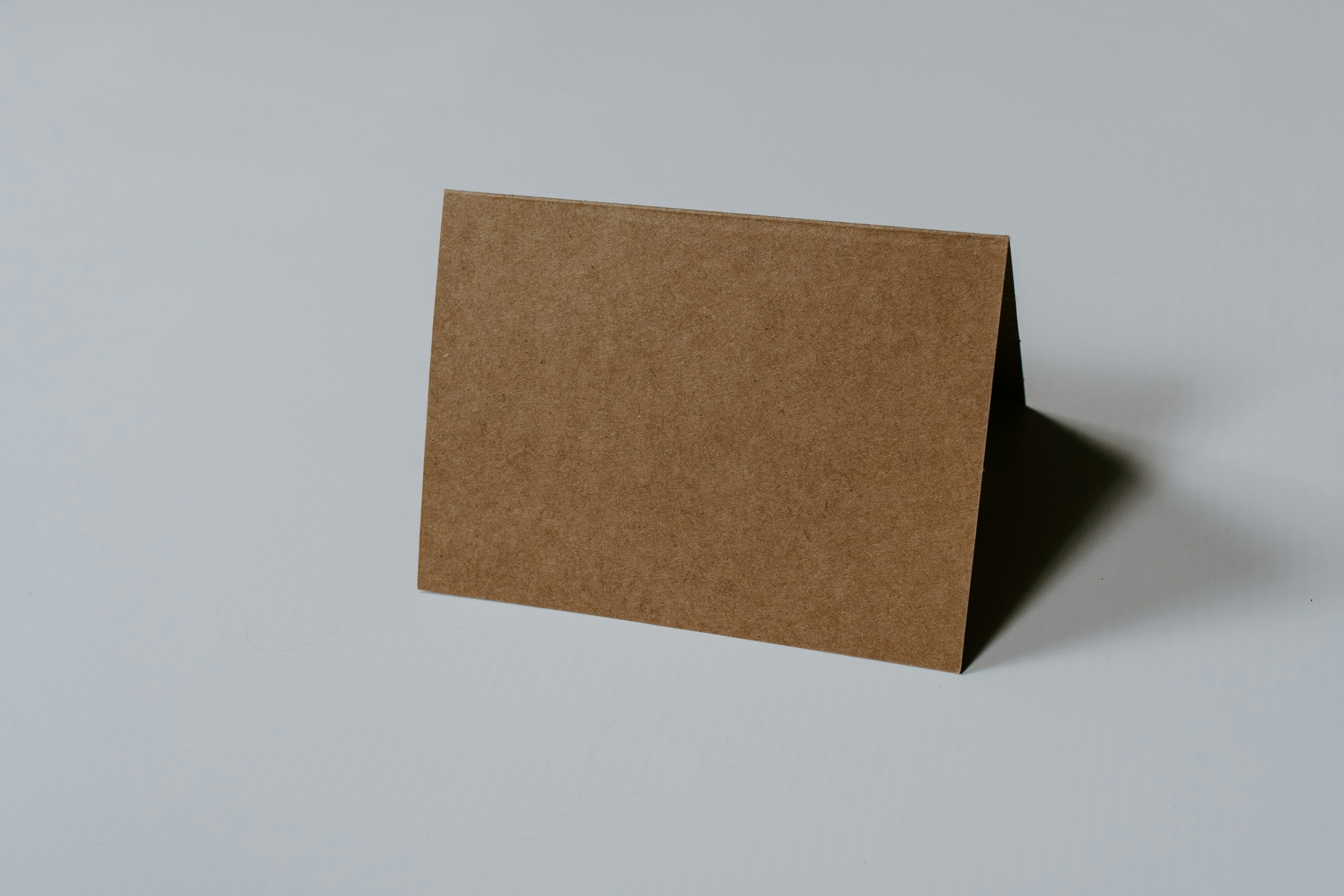For years, the debate on the use of technology has taken over the world of football. Is the use of technology good for football? Does technology help football referees eradicate errors? Why isn’t this technology already in widespread use like it is in cricket, rugby or the NFL? These are all questions fans have asked themselves over the past decade and all of the questions are reasonable. In the real world, technology has been embraced and used all the time, so why is the acceptance level so low in football? When looking at VAR, an abbreviation for Video Assistant Referee, you need to look at how it helps the game and how it makes matches the fairest they can be. I am sure we have all questioned a referee’s decision in a match and we all know who is deemed a competent referee and who is not, but we can all agree that for years they have needed help with their calls.
 |
| ▲ Referees reviewing a play on the monitors in the video operation room. (Photo from zig.com) |
So what is a VAR and when was it first introduced? A Video Assistant Referee is a football assistant referee who reviews decisions made by the head referee with the use of video footage and a headset for communication of the review back on to the field. VAR only intervenes in the course of a match when the officials have made a 'clear and obvious error' in one of four key areas. Firstly, let’s look at goals. A close offside decision is the most common reason to support consulting a VAR after a goal has been scored, but shirt-pulling and other infringements can cause goals to be chalked off. Second, the most subjective and arguably problematic area is penalties. Penalties can be awarded or rescinded using a VAR if there has been a 'clear and obvious error' in the original decision. Next, are straight red cards. Violent conduct and dangerous tackles can be penalized using a VAR. However, second-yellow cards cannot be reviewed. Lastly, a VAR should be used in the case of mistaken identity. If the referee sends off the wrong player, like what happened in the infamous incident between Kieran Gibbs and Alex Oxlade-Chamberlain during Arsenal's 6-0 thrashing at Chelsea in 2014, that injustice can be resolved. VAR was first conceived by the Refereeing 2.0 project in the early 2010s, under the direction of the Royal Netherlands Football Association (KNVB) and the system was tested through mock trials during the 2012–13 season of the Eredivisie, Netherlands’ top football league. On 3 March 2018, the International Football Association Board (IFAB) wrote the VARs into the Laws of the Game on a permanent basis following trials in a number of major competitions. As of the 2018/19 season, among the 5 biggest leagues in Europe, only the English Premier League has not implement the use of VAR in their game. However, there will be a change next season as Premier League teams voted in principle to bring Video Assistant Referees to the Premier League from the 2019/20 season onwards.
The sport's governing bodies want to improve decision-making and accuracy. FIFA president Gianni Infantino, a strong supporter of the technology, has described VARs as "the future of modern football". The usage of VARs comes with lots of benefits. The obvious advantage that springs to mind is that it enables referees a second chance to look at a passage of play before deciding on the appropriate course of action – avoiding the brash, undeserved red card and instead give way to a cool-headed, thoroughly thought through decision. A perfect example of this took place during the Egypt vs Russia match in the last World Cup. Egypt’s talisman, Mohamed Salah was awarded a free kick after he was brought down at what seemed like the edge of the penalty box. However, after the review by the VAR, the referee awarded a penalty instead, as the video showed that the foul continued into the penalty box. In addition, the current format of the VAR system equates to an on-field equivalent of goal-line technology and even though that had its teething problems upon its implementations nowadays we can’t imagine football without it – it is clear cut and has completely revolutionized the game we know and love. FIFA do however admit that their product is still a work in progress and say that in the group stages of the recent Confederations Cup, VARs helped make 6 “game-changing decisions” and resolved 29 “major incidents” accurately, so it evidently does work to an extent. "I would say to the fans, players and coaches that it will have an impact, a positive impact," said Fifa President Infantino. "That is what the results of the study show. From almost 1,000 live matches that were part of the experiment, the level of the accuracy increased from 93% to 99%. It's almost perfect." Former Premier League referee, Chris Foy told CNN Sport "The beauty of VAR is, that as a referee, if you make a call that's wrong, you would suffer from that, you'd hurt and wouldn't be happy with yourself. VAR could probably take that away." The final advantage would be that it, in the simplest form, is aimed at protecting referees from the fury of fans and players alike – far too often you see players encircling the referee when they disagree, but now the referee can stand his or her ground with the help of VAR.
 |
| ▲ The match referee conducting an on-field review by going to a designated spot on the sideline, called the referee review area, to review the video with the help of the review assistant. (Photo from supersport.com) |
No matter how many benefits this technology brings, not everyone agrees with the implementation of VAR into the modern football game. Fans and pundits regularly complain about how “it’ll take away the spirit of the game” or “the takes away from the drama, it makes it too perfect”. Football pundit, Paul Ince once said on ITV Sport that he disagreed with VAR because it “doesn’t give you anything to talk about down in the pub”. Like, seriously? It is just ridiculous to try and base the validity of VAR on something so trivial. If you pick unusual situations to argue against VAR, that essentially means you cannot find a reasonable, realistic argument. One of the biggest complaints about the VAR is that we have no idea what is being reviewed at times, particularly in venues with no big screen. FIFA say they are working on a system to keep supporters informed. For instance, during the match between Portugal and Mexico, Pepe had a goal ruled out for Portugal for offside and whilst it was the correct decision, we had absolutely no idea what was going on. We didn’t know what was being reviewed and there was only mass confusion and condemnation of the system. FIFA said that they are working on a system to keep supporters informed. All it would take is a line of communication between the reviewers and the referee along with the video replay shown and all confusion is gone. When that problem is solved, there is nothing that can realistically be argued against the system. A similar debate has gone on from awhile back, when the goal-line technology was first introduced. Pundits being pundits, complained about the technology saying it will “take away the spirit of the game”. However, since goal-line technology has seamlessly been implemented into the modern game, not a word of complaint was said.
"The VAR tests during this Confederations Cup are also helping us to improve the processes and fine-tune communication. What fans have been waiting for over so many years is finally happening. This is a milestone tournament. Video Assistant Refereeing is the future of modern football." said FIFA President Gianni Infantino. Ultimately, VAR can only be a positive in football. The world changes and so does sport, especially football. There was outcry when they changed the back pass rule and we got through that, there was outcry when they introduced goal-line technology and we managed to implement that perfectly into our game, so why not VAR? People are scared of change, but this is change that is desperately needed. We cannot have perfect games in terms of refereeing decisions, but by using VAR, we can get as close as humanly possible to being correct the majority of times during a 90-minute period.
Tsai Ming Hsuan dankookherald@gmail.com

 Vote for the Campus Brand Naming!
Vote for the Campus Brand Naming!

![[Campus Magnifier] Let's Surf the Library!](/news/thumbnail/202404/12496_1765_4143_v150.jpg)




